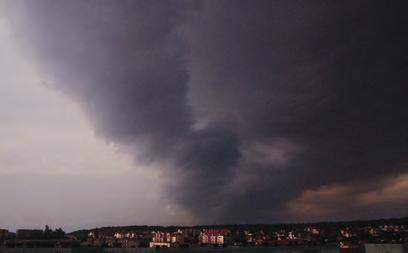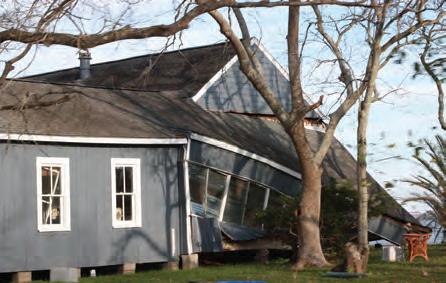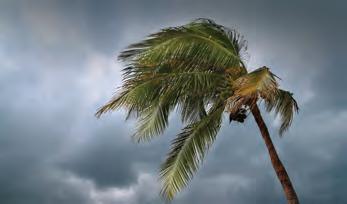
7 minute read
About tornadoes
from Engleski 1
Track 11
Read the text about tornadoes and the interview which follows and underline all the words that are new to you. Can you guess the meanings of the words from the context?
Advertisement
READING
About 1,000 tornadoes are reported across the United States every year, but they also occur in many other parts of the world, including Australia, Europe, Africa, Asia, and South America. Tornadoes are perhaps the strongest winds on Earth and can be described as violently rotating columns of air. They are powerful, unpredictable and can destroy anything that lies in their path. They can smash buildings, lift and turn over cars, etc. The most likely time for a tornado is a spring afternoon. Clouds become dark and the faster the winds are, the louder the noise is. They can last from several seconds up to more than an hour. Scientific research hasrevealedthat tornadoes usually form under certain types of atmospheric conditions and a tornado’s wind can be detected by radar. However, it is not yet possible to predict in advance exactly when and where they will develop and some tornadoes occur in situations where the radar can’t ‘see’ them. That’s why ordinary citizens volunteer to watch out for approaching tornadoes.
AN INTERVIEW

In an interview, a meteorology researcher (R) at the University of Oklahoma explains his fascination and his work with tornadoes.
R: “I have been interested in the weather since I was quite young. I used to cut out the daily weather maps from the local newspapers and make weekly summaries for my school newspaper when I was just 7 or 8 years old. I have always wanted to understand how things work, to learn more about physics, mathematics and nature. I became interested in tornadoes when I moved west to Colorado from Massachusetts several years ago. I am amazed by the structure, beauty and power of these storms. I want to understand more about how they form and what’s going on inside them.”
Q: How do you find tornadoes and how do you chase them?
R: “We forecast the general area in which tornadoes are likely to form. Then we drive around that region and wait for storms to form. When they do, we target the most interesting thunderstorms, and try to place our radars near the region where the tornadoes form.”
39
40 Q: What has been your scariest moment while chasing a tornado?
R: “This may sound boring, but we haven’t really had many scary moments. We are involved in an intense scientific mission to try to understand one of the most powerful forces of nature. But we cannot afford to be thrill-seekers, or to take unreasonable risks. We are mainly focused on the mission, where to go next, how to target the storm, and how to escape.”

Glossary
to detect – to notice; spot summary – a short clear description that gives the main facts or ideas about something to forecast – to say what you expect to happen in the future to target – to select something as an object of attention or attack; aim; go for intense – having a very strong effect; powerful (e.g. intense cold/heat/hatred) thrill-seeker – someone who does dangerous things looking for excitement thrill – a feeling of extreme excitement, usually caused by something pleasant to seek (sought, sought) – to try to find or get something; look for, search
COMPREHENSION
1 Finish these sentences according to the information from the text.
1. Because of their power, tornadoes can ….. 2. Research has revealed that tornadoes usually form ….. 3. It is not yet possible to predict in advance ….. 4. People volunteer to help ….. 5. A meteorology researcher became interested in tornadoes because ….. 6. They haven’t had many scary moments because ….

SPEAKING
Describe what people who study and chase tornadoes really do.
VOCABULARY
a cb
1 Read the sentences with the highlighted words/expressions again. Then match the words with their explanations below and write them down. 1. _______________ = will probably happen or is expected 2. _______________ = break, destroy 3. _______________ = before a particular date or time; ahead 4. _______________ = to follow; to put a lot of time and effort trying to get something 5. _______________ = to happen 6. _______________ = to make known or show something that was previously unknown
2 Complete the sentences using the words/expressions below. likely reveal appropriate occur thrill summary in advance intense
1. Do remind me because I’m ______________ to forget. 2. Violence of some sort seems to ______________in every society. 3. Did her biographer ________________ that she was not as rich as everyone thought? 4. Is this film _________________for young children? 5. He suddenly felt _____________ pain in his back. 6. At the end of the news, they often give you a _______________of the main news stories. 7. If you’re going to come, please let me know__________________. 8. So why do people still go hunting – is it the _________________ of the chase?
3 In the box on the right, find one word which is a synonym and one which is an antonym of the following words:
thrill ___________ ____________ major ___________ ____________ likely ___________ ____________ reveal ___________ ____________ boredom minor conceal excitement probable make public unlikely main
WORD FORMATION
Adjectives ending in -ed or -ing. Look at these examples from the text. 1. I have been interested in the weather since I was quite young. (Interested describes how I feel.) 2. We targeted the most interesting thunderstorms. (Interesting describes what the thunderstorms were like.)
PRACTICE
1. Circle the correct word. 1. We didn’t have many frightening / frightened moments climbing the steep rocks. 2. Chasing tornadoes can’t be a bored / boring event. 3. I was very excited / exciting when I found myself in the heart of a tornado. 4. What a thrilled / thrilling match! We have won for the first time.
2 Complete the sentences with words from the list in the correct form. annoy fascinate depress confuse 1. Cheer up. Don’t feel so _______________ . There are plenty of other jobs. 2. The noise was so ______________ that I couldn’t study. 3. There are a lot of road signs. It’s all very _________________ . 4. Susan’s little sister was ________________ by my old toys.
41
42 GRAMMAR
THE PRESENT PERFECT TENSE
Look at the following sentences and say how we form the present perfect tense:
1. I have always wanted to understand how things work. 2. We haven’t really had many scary moments.
We use the present perfect tense to talk about: 1 unfinished actions
The action began in the past and is still going on now.
I’ve read 20 pages of this book so far. We use adverbs which show that the period of time is not finished yet: today, this morning/week/month/year, etc. I’ve had two tests this week.
2 recent events
We have made a lot of progress in understanding tornadoes in recent years.
Adverbs used to talk about the recent past are: just, already, yet, lately/recently, etc.
3 general experiences
I’ve seen a tornado. We often use adverbs such as: never, ever, before, etc.
Have you ever been scared?
For more information, see the Grammar summary.
PRACTICE
1 Complete these sentences using the present perfect tense of the verb in brackets.
1. How long ___________ Nick _____________ in hospital? (be) 2. ____________you__________ Jane recently? (see) 3. Is John still driving his old car? No, he __________________a new one. (just, buy) 4. This is the second time we _______________ together in the competition. (play) 5. ___________you _____________ the news about the disaster in New Orleans? (hear) 6. __________you _________ the tickets? No, I ___________________them yet. (book) 7. How many times ____________you ___________ this book? (read)
2 Underline the correct word as in the example.
Example: She hasn’t had a holiday since/for last summer. 1. Cameron has written three letters to Jane since/for she left him. 2. Tessa hasn’t been ill since/for quite some time. 3. I have had this cold since/for I got wet in the rain. 4. How long have you been here? Since/For four o’clock.

3 Write down three things you have done this month and three things you haven’t done yet, but would like to do. Compare your answers with other students.
Example: I have read two books. / I haven’t made plans for my holiday.






